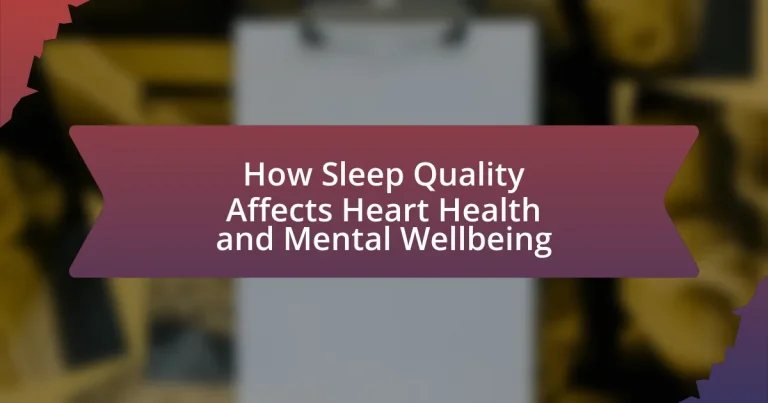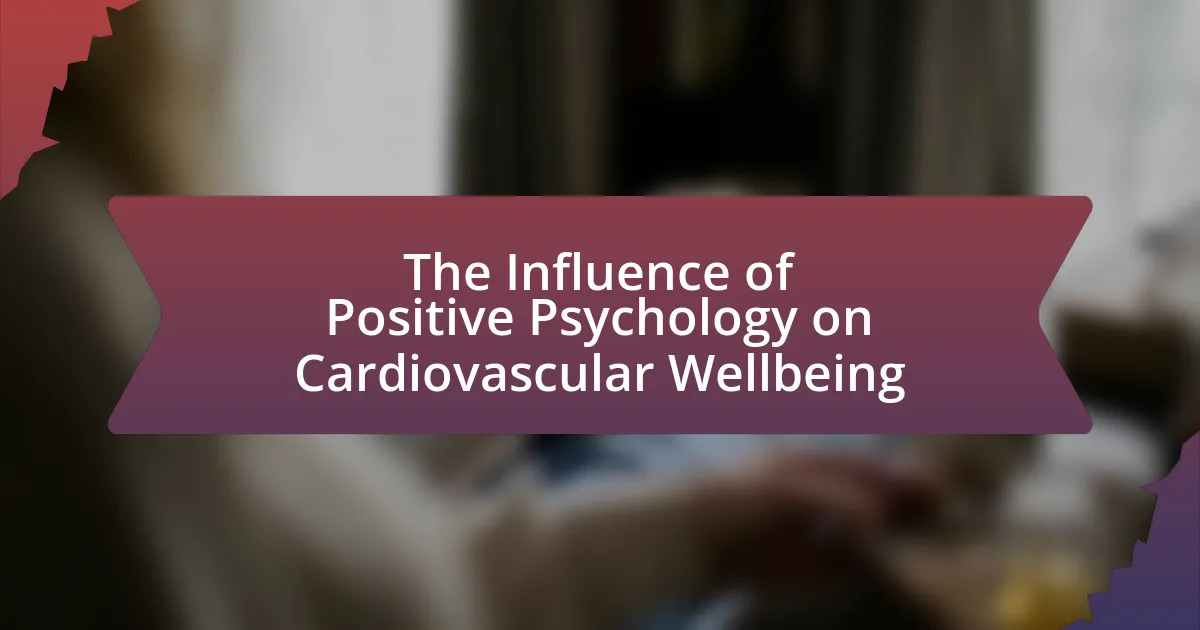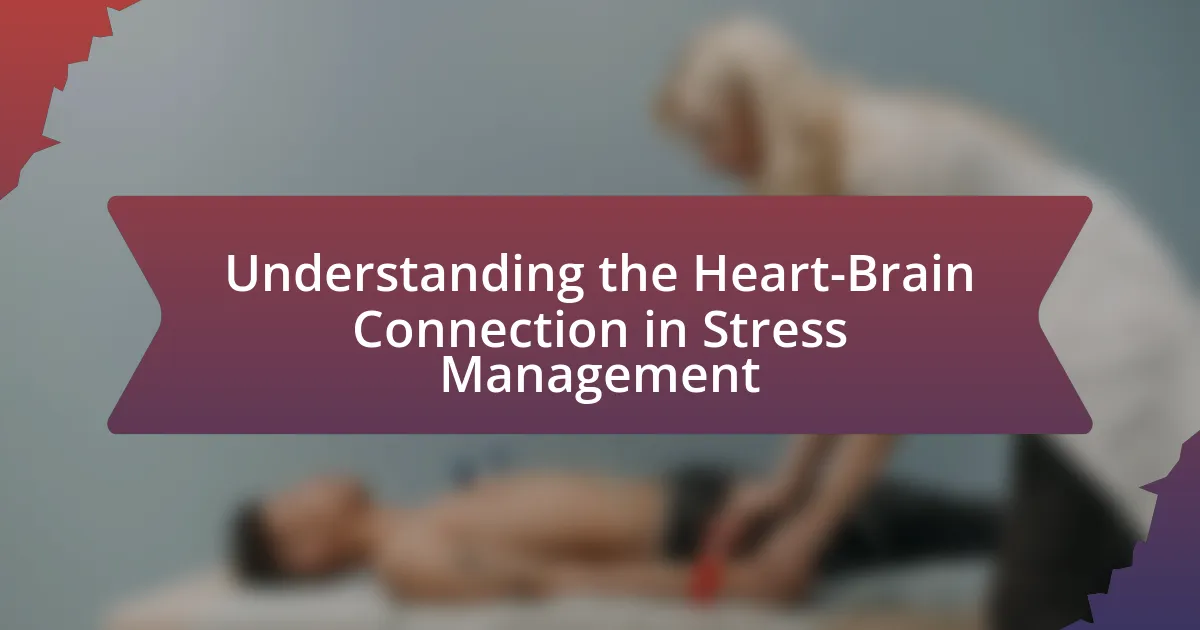The article examines the critical relationship between sleep quality, heart health, and mental wellbeing. It highlights how poor sleep can lead to increased cardiovascular risks, such as hypertension and heart disease, by affecting blood pressure, heart rate variability, and cholesterol levels. Additionally, the article discusses the psychological effects of inadequate sleep, including heightened anxiety and depression, and emphasizes the bidirectional connection between heart health and mental wellbeing. Strategies for improving sleep quality and overall health, such as lifestyle changes and relaxation techniques, are also outlined, underscoring the importance of restorative sleep for both cardiovascular and mental health.

How does sleep quality impact heart health?
Sleep quality significantly impacts heart health by influencing cardiovascular risk factors such as blood pressure, inflammation, and heart rate variability. Poor sleep quality has been linked to increased levels of stress hormones, which can elevate blood pressure and contribute to heart disease. Research indicates that individuals who experience sleep disturbances are at a higher risk for developing conditions like hypertension and coronary artery disease. For instance, a study published in the Journal of the American College of Cardiology found that individuals with poor sleep quality had a 1.5 times greater risk of cardiovascular events compared to those with good sleep quality. Thus, maintaining high sleep quality is essential for promoting heart health and reducing cardiovascular risks.
What are the physiological effects of poor sleep on the heart?
Poor sleep negatively impacts heart health by increasing the risk of cardiovascular diseases. Specifically, inadequate sleep can lead to elevated blood pressure, increased heart rate, and heightened inflammation, all of which strain the heart. Research indicates that individuals who consistently sleep less than seven hours per night have a higher likelihood of developing heart disease, as shown in a study published in the Journal of the American College of Cardiology, which found that poor sleep quality is associated with a 45% increased risk of coronary artery disease. Additionally, sleep deprivation disrupts the body’s ability to regulate stress hormones, further contributing to heart-related issues.
How does sleep deprivation influence blood pressure?
Sleep deprivation increases blood pressure by activating the body’s stress response, which leads to elevated levels of cortisol and adrenaline. These hormones cause blood vessels to constrict, resulting in higher blood pressure readings. Research indicates that individuals who consistently experience inadequate sleep are at a greater risk of developing hypertension, with studies showing that those sleeping less than six hours per night have a significantly higher likelihood of elevated blood pressure compared to those who sleep seven to eight hours. This relationship underscores the importance of adequate sleep for maintaining cardiovascular health.
What role does sleep play in heart rate variability?
Sleep significantly influences heart rate variability (HRV) by promoting autonomic nervous system balance and recovery. During deep sleep, the body experiences increased parasympathetic activity, which enhances HRV, indicating better cardiovascular health and stress resilience. Research shows that poor sleep quality correlates with reduced HRV, suggesting that inadequate sleep can lead to increased cardiovascular risk and stress-related disorders. A study published in the Journal of Clinical Sleep Medicine found that individuals with sleep disturbances exhibited lower HRV, reinforcing the connection between sleep quality and heart health.
Why is sleep quality crucial for cardiovascular health?
Sleep quality is crucial for cardiovascular health because it directly influences heart function and overall cardiovascular risk. Poor sleep quality is associated with increased blood pressure, inflammation, and elevated stress hormones, all of which can lead to heart disease. Research indicates that individuals who experience sleep disturbances have a higher likelihood of developing conditions such as hypertension and coronary artery disease. For instance, a study published in the Journal of the American College of Cardiology found that individuals with poor sleep quality had a 1.5 times greater risk of cardiovascular events compared to those with good sleep. Thus, maintaining high sleep quality is essential for reducing cardiovascular risks and promoting heart health.
What are the long-term risks associated with poor sleep and heart disease?
Poor sleep significantly increases the long-term risks of developing heart disease. Chronic sleep deprivation is linked to hypertension, elevated stress hormones, and inflammation, all of which contribute to cardiovascular problems. Research indicates that individuals who consistently sleep less than seven hours per night have a higher risk of heart attack and stroke, with studies showing a 45% increased risk for those with sleep disorders. Additionally, poor sleep quality can lead to obesity and diabetes, both of which are major risk factors for heart disease.
How does sleep quality affect cholesterol levels?
Sleep quality significantly impacts cholesterol levels, as poor sleep is associated with increased levels of LDL cholesterol and decreased levels of HDL cholesterol. Research indicates that individuals who experience sleep disturbances or insufficient sleep tend to have higher cholesterol levels, which can contribute to cardiovascular diseases. A study published in the Journal of Clinical Sleep Medicine found that participants with sleep apnea had elevated LDL cholesterol levels compared to those with normal sleep patterns, highlighting the direct correlation between sleep quality and cholesterol regulation.

How does sleep quality influence mental wellbeing?
Sleep quality significantly influences mental wellbeing by affecting mood, cognitive function, and emotional regulation. Poor sleep quality is associated with increased risks of anxiety, depression, and stress-related disorders. Research indicates that individuals who experience inadequate or disrupted sleep report higher levels of psychological distress. For instance, a study published in the journal “Sleep” found that individuals with insomnia are ten times more likely to develop depression compared to those with good sleep quality. Additionally, sleep deprivation impairs cognitive processes such as attention and decision-making, further exacerbating mental health issues. Thus, maintaining good sleep quality is essential for optimal mental wellbeing.
What are the psychological effects of inadequate sleep?
Inadequate sleep leads to significant psychological effects, including increased anxiety, depression, and impaired cognitive function. Research indicates that sleep deprivation can elevate stress hormones, which contribute to anxiety disorders and depressive symptoms. A study published in the journal “Sleep” found that individuals who consistently sleep less than seven hours per night are at a higher risk of developing mood disorders. Additionally, cognitive impairments such as reduced attention, memory deficits, and poor decision-making are commonly observed in those with insufficient sleep, as highlighted in research from the National Institutes of Health. These psychological consequences underscore the critical role of sleep in maintaining mental health and cognitive performance.
How does sleep deprivation contribute to anxiety and depression?
Sleep deprivation significantly contributes to anxiety and depression by disrupting the brain’s ability to regulate emotions and stress responses. When individuals experience insufficient sleep, the amygdala, which is responsible for processing emotions, becomes hyperactive, leading to increased feelings of anxiety and heightened emotional responses. Additionally, chronic sleep deprivation affects neurotransmitter systems, particularly serotonin and dopamine, which are crucial for mood regulation. Research indicates that individuals with insomnia are ten times more likely to develop depression compared to those who sleep well, highlighting the strong correlation between poor sleep quality and mental health disorders.
What cognitive functions are impaired by poor sleep quality?
Poor sleep quality impairs several cognitive functions, including attention, memory, decision-making, and problem-solving abilities. Research indicates that sleep deprivation negatively affects the prefrontal cortex, which is crucial for higher-order cognitive processes. A study published in the journal “Sleep” by Goel et al. (2009) found that individuals with poor sleep quality exhibited significant deficits in attention and working memory tasks. Additionally, the National Institutes of Health report that chronic sleep disturbances can lead to long-term cognitive decline, emphasizing the critical role of sleep in maintaining cognitive health.
Why is restorative sleep essential for mental health?
Restorative sleep is essential for mental health because it facilitates cognitive function, emotional regulation, and overall psychological resilience. During restorative sleep, particularly in the REM and deep sleep stages, the brain processes emotions, consolidates memories, and clears toxins, which are crucial for maintaining mental clarity and emotional stability. Research indicates that insufficient restorative sleep is linked to increased risks of anxiety, depression, and cognitive decline, as evidenced by a study published in the journal “Sleep” by Walker et al., which found that sleep deprivation negatively impacts mood and cognitive performance.
How does sleep affect emotional regulation?
Sleep significantly impacts emotional regulation by influencing brain function and hormonal balance. Adequate sleep enhances the brain’s ability to process emotions, leading to improved mood and emotional stability. Research indicates that sleep deprivation can result in heightened emotional reactivity and impaired decision-making, as seen in a study published in the journal “Sleep,” which found that individuals with insufficient sleep exhibited increased amygdala activation in response to emotional stimuli. This suggests that poor sleep quality can exacerbate negative emotions and reduce the ability to cope with stress effectively.
What is the relationship between sleep quality and stress levels?
Sleep quality and stress levels are inversely related; higher stress levels typically lead to poorer sleep quality. Research indicates that stress activates the body’s fight-or-flight response, which can disrupt sleep patterns and lead to insomnia. A study published in the journal “Sleep” found that individuals experiencing high levels of stress reported significantly lower sleep quality and increased sleep disturbances. This relationship highlights the importance of managing stress to improve sleep quality and, consequently, overall mental wellbeing.

What are the connections between heart health and mental wellbeing?
Heart health and mental wellbeing are interconnected, as poor cardiovascular health can lead to increased risks of anxiety and depression. Research indicates that individuals with heart disease are more likely to experience mental health issues, with studies showing that approximately 30% of patients with heart disease also suffer from depression. Conversely, mental health disorders can negatively impact heart health by contributing to unhealthy behaviors such as poor diet, lack of exercise, and smoking, which are risk factors for cardiovascular disease. This bidirectional relationship highlights the importance of addressing both heart health and mental wellbeing in healthcare settings to improve overall health outcomes.
How does heart health impact mental wellbeing?
Heart health significantly impacts mental wellbeing by influencing mood, cognitive function, and overall mental health. Poor cardiovascular health can lead to increased levels of anxiety and depression, as evidenced by studies showing that individuals with heart disease are more likely to experience mental health disorders. For instance, research published in the Journal of the American College of Cardiology found that patients with heart failure had a higher prevalence of depression, affecting their quality of life and treatment outcomes. Additionally, the connection between heart health and mental wellbeing is mediated by factors such as inflammation and stress, which can exacerbate both physical and mental health issues.
What are the psychological effects of living with heart disease?
Living with heart disease can lead to significant psychological effects, including anxiety, depression, and decreased quality of life. Research indicates that individuals with heart disease often experience heightened levels of anxiety due to concerns about their health and potential life-threatening events. A study published in the Journal of the American College of Cardiology found that approximately 30% of patients with heart disease exhibit symptoms of depression, which can further complicate their medical condition and recovery process. Additionally, the chronic nature of heart disease can lead to feelings of helplessness and social isolation, exacerbating mental health issues. These psychological effects can negatively impact adherence to treatment and overall health outcomes, highlighting the importance of addressing mental health in patients with heart disease.
How can heart health improvements enhance mental health?
Improvements in heart health can enhance mental health by increasing blood flow and oxygen supply to the brain, which supports cognitive function and emotional regulation. Research indicates that cardiovascular health is closely linked to mental well-being; for instance, a study published in the Journal of the American College of Cardiology found that individuals with better heart health reported lower levels of anxiety and depression. Additionally, regular physical activity, which benefits heart health, has been shown to release endorphins, further improving mood and reducing stress.
What strategies can improve both sleep quality and overall health?
To improve both sleep quality and overall health, individuals should adopt a consistent sleep schedule, engage in regular physical activity, and practice relaxation techniques. A consistent sleep schedule, where individuals go to bed and wake up at the same time daily, helps regulate the body’s internal clock, leading to better sleep quality. Regular physical activity has been shown to enhance sleep quality by reducing insomnia symptoms and increasing the amount of deep sleep. Additionally, relaxation techniques such as mindfulness meditation or deep breathing exercises can lower stress levels, which is crucial for achieving restorative sleep. Research indicates that these strategies not only enhance sleep quality but also contribute to improved cardiovascular health and mental wellbeing, as evidenced by studies linking better sleep patterns with lower risks of heart disease and anxiety disorders.
What lifestyle changes promote better sleep and heart health?
Regular exercise, a balanced diet, stress management, and maintaining a consistent sleep schedule promote better sleep and heart health. Engaging in physical activity for at least 150 minutes per week can lower the risk of heart disease and improve sleep quality by reducing anxiety and depression. A diet rich in fruits, vegetables, whole grains, and lean proteins supports cardiovascular health and helps regulate sleep patterns. Managing stress through techniques such as mindfulness or yoga can lower blood pressure and improve sleep. Additionally, going to bed and waking up at the same time daily helps regulate the body’s internal clock, enhancing sleep quality and overall heart health.
How can mindfulness and relaxation techniques improve sleep quality?
Mindfulness and relaxation techniques can significantly improve sleep quality by reducing stress and anxiety, which are common barriers to restful sleep. Research indicates that practices such as meditation, deep breathing, and progressive muscle relaxation activate the body’s relaxation response, leading to lower heart rates and reduced cortisol levels. A study published in JAMA Internal Medicine found that mindfulness meditation improved sleep quality and reduced insomnia symptoms in participants, demonstrating the effectiveness of these techniques in promoting better sleep. By fostering a calm mental state and enhancing emotional regulation, mindfulness and relaxation techniques create an optimal environment for restorative sleep, ultimately benefiting overall heart health and mental wellbeing.





